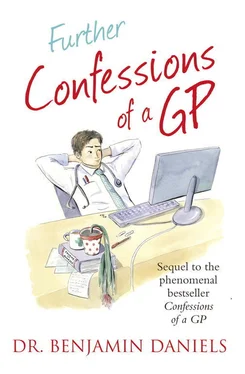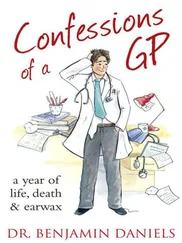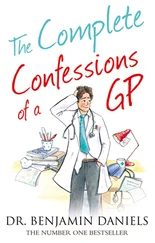Tarig poked his tongue out at me and it was covered in a white fur.
‘It’s sore every time I eat,’ he told me.
‘It’s a fungal infection on your tongue.’
‘Is it because of my disease?’
‘Yes, the HIV is affecting your immune system.’
He shrugged and went to stand up and leave.
‘Still not going to consider taking any medications for it?’
‘No, Doctor. You know that my fate is God’s will, not yours or mine.’
It was now my turn to shrug. I nearly let him leave, but as a doctor it is so hard to watch a dying man walk away, knowing that he could be treated and effectively cured.
‘It’s not too late to change your mind, Tarig. On medication you could live a long and normal life.’
Tarig was a Coptic Christian from Egypt. He was a strictly religious man, but he slept with a prostitute while on a business trip to the Sudan and contracted HIV. Rather than accept treatment, he decided that the HIV was a punishment from God that he must suffer, even if this meant a painful, premature death.
As a teenager I used to get drawn into long religious debates with Jehovah’s Witnesses who came knocking at the door. I was convinced that I would enlighten them as to what I believed to be the flaws in their religious convictions. They of course felt they could do the same for me. You won’t be surprised to hear that after many wasted hours of debate on my doorstep, I had failed to convert a single Jehovah’s Witness to atheism. As I’ve got older, my atheist ideas have remained, but now I wouldn’t dream of challenging anyone else about their religious views, especially my patients. My job is to treat them within their cultural beliefs rather than inflict my own upon them, but this can be difficult when their viewpoint is affecting their physical health. I just couldn’t bring myself to let go of Tarig.
‘Tarig, when you’re about to cross a busy road, do you look left and right first?’
‘Yes, of course.’
‘But surely if a car hits you that would be God’s will too?’
‘Yes, God will decide my fate, but he wants me to take some responsibility too. He wanted me to resist temptation when he sent the whore to cross my path, but I failed him and I must accept the consequences of my sin. I must suffer for my redemption.’
I felt a bit like the teenage me arguing in vain with the Jehovah’s Witnesses. As a GP I’ve witnessed some of the enormous good religion can achieve. Some of my patients have given up drugs and crime in order to embrace the love of the Lord. Some of our local religious communities offer amazing support for members of their flock who are taken ill both physically and mentally. Faith can also help people overcome enormous personal suffering and help them move on and find meaning in their lives. I wasn’t trying to convert Tarig to atheism; I simply wanted him to agree to take life-saving medications that were freely available at our local HIV clinic.
The last time I witnessed someone die of AIDS was 2002. He was a young man, barely out of his teens, and he was lying helplessly in filthy sheets in a Mozambique hospital. I can still picture the painful-looking sores eating into his lips and the skin cancers that had spread all over his body. Pneumonia was taking over his lungs, meaning he was gasping for breath. His broad shoulders showed how muscular he had once been, but now he was hunched over with his muscles all but completely wasted away. We gave him antibiotics to try to fight the infection but the HIV virus had completely destroyed his immune system. Each day on the ward round I saw him fade further away until he was almost a skeleton. Everyone was surprised how long he lasted. Finally, during my last week there, he gasped his last breath in front of my eyes.
Times have changed and now HIV is brilliantly managed by our local clinic. People living with HIV today can look forward to a normal life expectancy on treatment. Without treatment the condition is unpredictable and dangerous. I feel woefully out of my depth with Tarig, but while he continues to refuse to take treatment or be seen by the specialist, he is stuck with me, and I with him.
‘Look, Tarig, let me at least treat the thrush on your tongue. I can give you some drops that will clear it. And can you let me do some blood tests so that we know at what stage your disease is?’
Tarig reluctantly agreed.
I documented again very carefully Tarig’s decision to decline a referral to the HIV team and that he was of sound enough mind to make this choice. If he was genuinely going to die of this disease, I needed to make sure that I was able to protect myself medico-legally from any potential fallout.
Is the quality of NHS care really declining?
Late one evening 30 years ago, the senior partner at my surgery visited a six-year-old boy at home with a fever. He diagnosed a viral illness and advised paracetamol. By the next morning, the young lad was dead from meningitis. Mortified to hear of his mistake he visited the grieving family to apologise, but rather than being met with anger and legal proceedings, he was thanked by the tearful parents for his help and efforts the previous night – and he continued to be the family’s GP for years to come.
The diagnosis of early meningitis is as difficult to make now as it ever was and it is still missed by doctors today, as it was 30 years ago. Losing a child to the disease is as horrendous as it always has been. The difference appears to be that expectations have changed. We don’t yet have lawyers loitering around A&E waiting rooms or chasing ambulances, but there definitely appears to be an increased awareness that medical errors can lead to financial compensation and claims continue to increase year on year.
Annual NHS compensation payouts grew from £277 million in 2000/01 to almost £1 billion in 2010/11. This is partly related to the increase in the number of claims but also to the increased cost of the individual claims, which can be up to £10 million each. Ironically, this increase is in part due to improved NHS care rather than an increase in errors. The young boy with the missed meningitis 30 years ago may well have survived today. The diagnosis may have still been missed early on, but improved intensive care facilities could have resulted in him surviving, albeit with severe brain damage and physical disabilities. The biggest compensation payouts are made to help financially support severely disabled children who may now live for several decades but remain in need of long-term expensive care packages.
So in these times of desperately low NHS resources, what can we do about expensive compensation payouts? The obvious answer is to reduce the number of cock-ups. This may seem simple enough, but unfortunately mistakes and errors will always happen. The causes are multiple and I am not trying to brush over or dismiss them. I am also not trying to excuse them or suggest that the NHS and its staff shouldn’t be held accountable; I am simply stating that as long as health care is delivered by humans, errors will be made.
Every day the tabloid media offer terrifying tales of health-care blunders. It feels like a continuous drip-feeding of the idea that the NHS is broken and doomed to collapse. These stories feed fears that every operation will be botched and every medical decision made will be the wrong one. I don’t begrudge compensation payouts when genuine mistakes have been made and I’m sure the families involved would rather have the good health of their loved one than a damages payment. However, it is important to recognise that the rise in the number of claims isn’t due to standards of care in the NHS falling. We still have a long way to go, but here on the coalface, I genuinely think that overall the quality of care is improving.
Читать дальше
Конец ознакомительного отрывка
Купить книгу











![Benjamin Franklin - Memoirs of Benjamin Franklin; Written by Himself. [Vol. 2 of 2]](/books/747975/benjamin-franklin-memoirs-of-benjamin-franklin-wr-thumb.webp)
![Benjamin Franklin - Memoirs of Benjamin Franklin; Written by Himself. [Vol. 1 of 2]](/books/748053/benjamin-franklin-memoirs-of-benjamin-franklin-wr-thumb.webp)